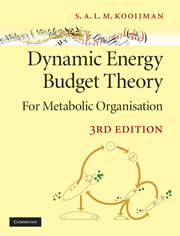Book contents
- Frontmatter
- Contents
- Preface
- 1 Basic concepts
- 2 Standard DEB model in time, length and energy
- 3 Energy, compounds and metabolism
- 4 Univariate DEB models
- 5 Multivariate DEB models
- 6 Effects of compounds on budgets
- 7 Extensions of DEB models
- 8 Covariation of parameter values
- 9 Living together
- 10 Evolution
- 11 Evaluation
- References
- Glossary
- Notation and symbols
- Taxonomic index
- Index
11 - Evaluation
Published online by Cambridge University Press: 05 June 2012
- Frontmatter
- Contents
- Preface
- 1 Basic concepts
- 2 Standard DEB model in time, length and energy
- 3 Energy, compounds and metabolism
- 4 Univariate DEB models
- 5 Multivariate DEB models
- 6 Effects of compounds on budgets
- 7 Extensions of DEB models
- 8 Covariation of parameter values
- 9 Living together
- 10 Evolution
- 11 Evaluation
- References
- Glossary
- Notation and symbols
- Taxonomic index
- Index
Summary
The aim of this short chapter is to place the deb model in the context of research in eco-energetics. I first summarise the collection of empirical models that turn out to be special cases of deb theory. Then I discuss some problems that are inherent to biochemical models for metabolism of individuals. Finally I discuss static energy budgets and their time-dependent relatives, the net production models, in comparison with the deb approach.
Empirical models that are special cases of deb theory
The emphasis of deb theory is on mechanisms. This implies a radical rejection of the standard application of allometric functions, which I consider to be a blind alley that hampers understanding. Although it has never been my objective to glue existing ideas and models together into one consistent framework, many aspects and special cases of the deb theory turned out to be identical or very similar to classic models, see Table 11.1. deb theory not only shows how and why these models are related, it also specifies the conditions under which these models might be realistic, and it extends the scope from the thermodynamics of subcellular processes to population dynamics.
A weird world at small scales
Many attempts exist to build models for cellular metabolism following the fate of some important compounds. Apart from the limited usefulness of models with many parameters and variables, these models typically suffer from lack of spatial structure, and the transformations are typically based on classic chemical kinetics.
- Type
- Chapter
- Information
- Dynamic Energy Budget Theory for Metabolic Organisation , pp. 430 - 437Publisher: Cambridge University PressPrint publication year: 2009



